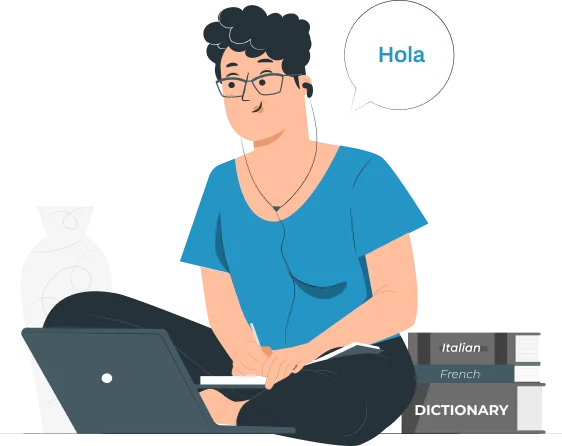
Spanish Language With 548.2 Million Global Speakers
Spanish language is the 5th most-spoken international language. Spanish population accumulates to 47.5 million people . Interestingly, the Spanish language is not limited to its borders, it is also the official and co-official language of 20+ countries. The Spanish language speakers include 474.2 million native and 74 million non-native speakers.
Among the different dialects of Spanish languages, the “Castilian” dialect is the most popular. Spanish is the second most spoken language in the US with over 41 million speakers. CCJK’s best Spanish to English translation services can give you an ideal jumpstart and enable you to attract potential customers from 17% of the global English-speaking population.
Go Global With Spanish To English Translation Services
Interestingly Spanish and English are two of the world’s five most spoken languages. The Spanish language services of CCJK ensure high-quality Spanish to English translations to assist businesses and enterprises. Enabling them to communicate and market effectively in the target markets. Our motto is to translate with industry-specific knowledge and expertise while ensuring consistency of terminologies and delivering Spanish translations that drive customers.
With the trend of global expansion of businesses and brands, industry-leading Spanish to English translation services provide the perfect solutions to many localization challenges. We’ll provide you with the most accurate Spanish to English translations that help you engage English customers in a professional manner and increase your chances for success.

We translate all kinds of Spanish documents
Need to translate Spanish documents? You’re at the right place. CCJK is equipped with industry-leading expertise and modern technology to deliver Spanish document translation services.
Technical translations into Spanish
Spanish medical translation services
Website translation into Spanish
Spanish legal translations
Technical translations into Spanish
As with other languages, the technical vocabulary of Spanish is complex enough to translate and verbalize while maintaining the original idea, context, and tone. Major businesses and brands acquire professional Spanish translation services to carry out this crucial task. This is where CCJK has played its role for the past two decades and continues to do so. Get CCJK’s Spanish translation services for your required documents today and you will surely appreciate the linguistic fluency and cultural precision of your Spanish translations.
Spanish medical translation services
Medical science is a living pulse for all beings and industries. Every once in a while, businesses, brands, and companies need to come up with medical solutions as happened in the wake of Covid. Resultantly clear information exchange plays an essential and life-saving role in the communication and implementation of medical progress. CCJK is always proud to help facilitate this information exchange process by providing professional medical translation services in Spanish and other languages. We keep costs reasonable and always provide accurate Spanish translation services for all medical literature.
Website translation into Spanish
Website translation is a key element of international branding. It is not just changing words but website translation is a professional practice and an integral part of the localization process. If carried out under professional guidance, it can help bridge language and cultural differences. Whether you want to translate the specific page or the entire Spanish site, we always welcome you for projects of any size and deliver within the required timeframe. We’re here to help you by offering the fastest Spanish translation services so you can get a headstart over your competitors.
Spanish legal translations
CCJK is well qualified to provide legal Spanish translations from English into Spanish, and Spanish into English, and offers 800 other language pairs. Our satisfied customer base includes individuals, law firms, financial companies, brands, and retailers in many sectors. These clients trust our modern Spanish translation services in areas such as law regulations, intellectual property, tax, insurance, immigration, technology, and more. The trademark due diligence of CCJK enables us to keep your information secure and intact, saving you from unnecessary delays and complexities.
Start Your Spanish Translation Now.
Meet our native Spanish translators
In our network of 30,000+ language experts, we’ve many native-speaking Spanish translators who know the language inside out. They know how Spanish is used in different parts of the world and are fluent in all dialects. When you want to hire our Spanish translation services, we’ll connect you with professionals who translate your documents by focusing on a specific dialect according to your target market.
Language support
Spanish translation services in 230 languages
A top provider of Spanish translation services, CCJK allows you to choose between 230 language options to get your documents translated into Spanish or from Spanish to other languages.
